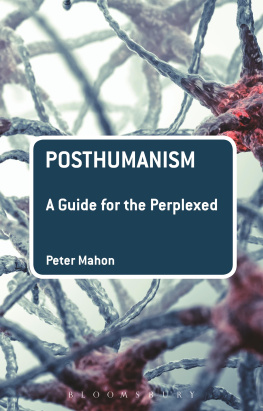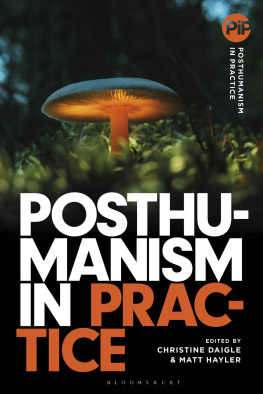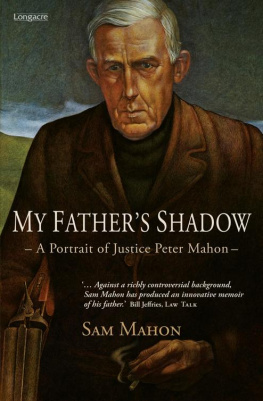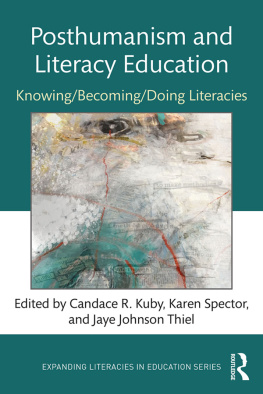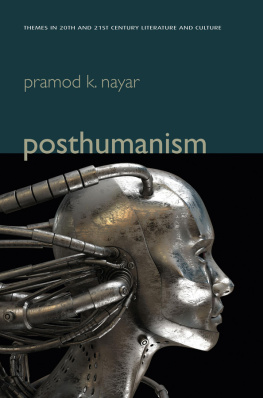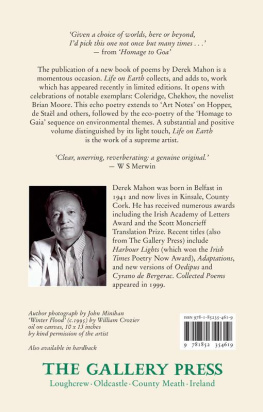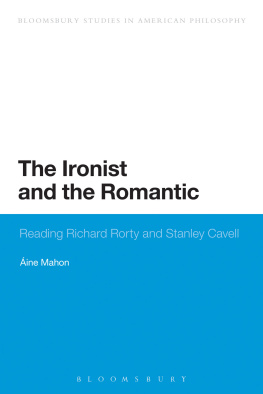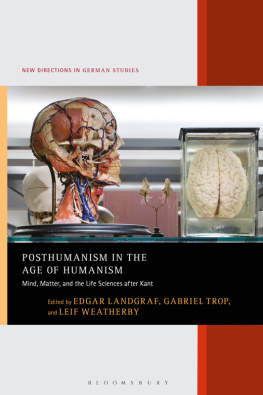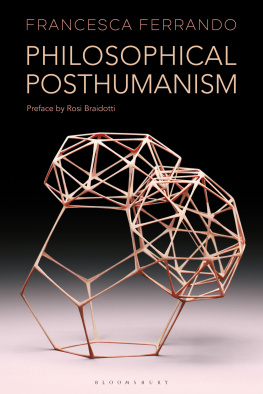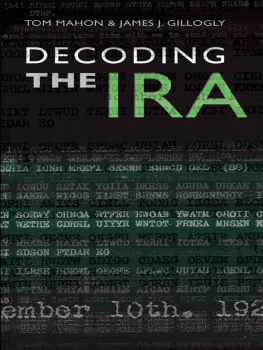Peter Mahon - Posthumanism
Here you can read online Peter Mahon - Posthumanism full text of the book (entire story) in english for free. Download pdf and epub, get meaning, cover and reviews about this ebook. year: 2017, publisher: Bloomsbury Publishing, genre: Romance novel. Description of the work, (preface) as well as reviews are available. Best literature library LitArk.com created for fans of good reading and offers a wide selection of genres:
Romance novel
Science fiction
Adventure
Detective
Science
History
Home and family
Prose
Art
Politics
Computer
Non-fiction
Religion
Business
Children
Humor
Choose a favorite category and find really read worthwhile books. Enjoy immersion in the world of imagination, feel the emotions of the characters or learn something new for yourself, make an fascinating discovery.
- Book:Posthumanism
- Author:
- Publisher:Bloomsbury Publishing
- Genre:
- Year:2017
- Rating:5 / 5
- Favourites:Add to favourites
- Your mark:
- 100
- 1
- 2
- 3
- 4
- 5
Posthumanism: summary, description and annotation
We offer to read an annotation, description, summary or preface (depends on what the author of the book "Posthumanism" wrote himself). If you haven't found the necessary information about the book — write in the comments, we will try to find it.
Posthumanism — read online for free the complete book (whole text) full work
Below is the text of the book, divided by pages. System saving the place of the last page read, allows you to conveniently read the book "Posthumanism" online for free, without having to search again every time where you left off. Put a bookmark, and you can go to the page where you finished reading at any time.
Font size:
Interval:
Bookmark:
Also available from Bloomsbury
Levinas: A Guide for the Perplexed
Husserl: A Guide for the Perplexed
Heidegger: A Guide for the Perplexed
Deleuze: A Guide for the Perplexed
Hegel: A Guide for the Perplexed
Kant: A Guide for the Perplexed
Gadamer: A Guide for the Perplexed
Wittgenstein: A Guide for the Perplexed
Ricoeur: A Guide for the Perplexed
Derrida: A Guide for the Perplexed
Spinoza: A Guide for the Perplexed
Husserl: A Guide for the Perplexed
Kierkegaard: A Guide for the Perplexed
Heidegger: A Guide for the Perplexed
Frege: A Guide for the Perplexed
Habermas: A Guide for the Perplexed
Sartre: A Guide for the Perplexed
Adorno: A Guide for the Perplexed
Existentialism: A Guide for the Perplexed
Merleau-Ponty: A Guide for the Perplexed
Hobbes: A Guide for the Perplexed
Leibniz: A Guide for the Perplexed
Hume: A Guide for the Perplexed
Nietzsche: A Guide for the Perplexed
Rousseau: A Guide for the Perplexed
Locke: A Guide for the Perplexed
Descartes: A Guide for the Perplexed
Berkeley: A Guide for the Perplexed
Schopenhauer: A Guide for the Perplexed
Plato: A Guide for the Perplexed
Marx: A Guide for the Perplexed
Christian Ethics: A Guide for the Perplexed
Aquinas: A Guide for the Perplexed
British Idealism: A Guide for the Perplexed
Relativism: A Guide for the Perplexed
Aristotle: A Guide for the Perplexed
Russell: A Guide for the Perplexed
Utilitarianism: A Guide for the Perplexed
Pragmatism: A Guide for the Perplexed

INT. BOOKSHOPDAY
Two posthumans are browsing the bookshelves. One takes a book off a shelf, reads the title, turns to the other, rolls his eyes theatrically, with a look of disgust on his face.
Posthuman 1: Ugh. Would you ever look at this? Posthumanism: A Guide for the Perplexed. Posthumanism? Bah! What in the name of my giddy aunt Gerty is posthumanism anyway? And why should I care? It sounds suspiciously like another one of those trendy but infuriating theoretical buzzwords that academia is so fond of, like deconstruction or intersectionality. You know, the kind of word that seems to take on a huge significance in less important fields of study (such as art history or literary/cultural studies), while being an object of ridicule in important ones (such as engineering or mathematics). Posthumanism! Just another typical academic buzzword, one that has no relevance for those of us who live in the real world outside of the ivory towers of academia and their self-important professors. Yes, the real worldyou know, that place where they expect results, and pressing political or economic matters make the business of survival an everyday concern? Posthumanism? Pfft! And, anyway, what was wrong with good old humanism? Honestly!
Posthuman 2: I know youre trying to be outrageous, but why on earth would you think that posthumanism has nothing to do with your life or that it is just another buzzword that privileged and out-of-touch academics use? Im also not sure that its a case of something being wrong with humanism, but instead a recognition that humanism may no longer be the best way to think about how our species understands its position in the twenty-first century. Posthumanism, if it means anything at all, is just an acknowledgement that humans and humanity are constantly changing through their interaction with technology and tools. In a nutshell, posthumanisms primary unit of analysis is humans + tools. And, if posthumanism is concerned with how toolswhich obviously extends to include all kinds of technologyand humans interact, then posthumanism is certainly not something that is confined to academia and self-important academics; it concerns everyone, everyday!
P1: But why post-humanism? So, Ill ask again, whats wrong with humanism?
P2: Okay. Well, if, as Michel then posthumanism, in its concern for humans + tools, would also predate any traditional humanism that has its roots in the seventeenth century. Posthumanism, in other words, would simply be a way of thinking that extends beyond humanism understood in that way.
P1: So, posthumanism extends beyond seventeenth-century humanism, then?
P2: Yes. And, to the extent that posthumanism is concerned with humans + tools, it is a neat umbrella term to cover the work of a diverse group of thinkers, researchers and scientists, such as Edwin who have all argued, in different ways, of course, that humans have always used tools and technology to extend themselves. Now, Im not claiming that all the writers Ive just named would call themselves posthumanistsfor example, Clark and McFarland wouldntonly that their thinking lines up with posthumanism as Ive defined it for you. And, if posthumanism stretches back to the very dawn of human tool usethat is, if posthumanism actually predates a concept that only took shape several centuries agothen it makes little sense to retain that concept when were exploring humans + tools.
P1: Well, then, shouldnt it just be called prehumanism?
P2: Fair point; I agree that the name seems a bit paradoxical. Id answer your question as follows: posthumanism is post-humanism rather than pre-humanism because, historically, it comes after humanism; and, even though posthumanism comes after historical humanism, it can nevertheless be used to discuss humans relations with their tools and technology, which had gotten underway long before humanism ever came along. So, posthumanism is both pre- and post- humanist. This situation should also make us somewhat wary of trying to reduce posthumanism to a simple fashion by historicizing it. There is thus, to be sure, a history of posthumanism, just like there is, say, a history of biologyits major discoveries, leading figures, shifts in technology used, and so on; but the fact remains that posthumanism engages with somethinghumans interacting with tools and technologythat is at once prehistoric and post-humanist.
P1: So why keep the humanism part of the name?
P2: Fair question. I think its appropriate to keep the humanism part because posthumanism doesnt make a simple break from humanism. I mean, itd be a bad ideanot to mention a contradictory oneto simply throw away every single humanist idea: imagine throwing away rationality, individuality, freedom, progress, rights, just because theyre old! Thatd be sheer idiocy. It would also be impossible, given the centrality of tools and technology to posthumanism: thus, freedom, rationality, progress, and science are all integral to it. So, it might be better to think of posthumanism as being a radicalization of humanist ideas beyond the historical specificity and constraints of humanism.
P1: Youre making it sound like posthumanism is really just humanism on steroids. Im losing sight of why its called posthumanism if its just a re-tread or radicalization of humanism.
P2: Well, it might be easier to see why posthumanism is a necessary name if you consider how certain discoveries in techno-science disrupt certain humanist notions about humans and humanity. I mentioned above that posthumanism, in its most basic sense, can be understood as being concerned with human(s) + tools. As such, posthumanism significantly overlaps with, for example, what
Font size:
Interval:
Bookmark:
Similar books «Posthumanism»
Look at similar books to Posthumanism. We have selected literature similar in name and meaning in the hope of providing readers with more options to find new, interesting, not yet read works.
Discussion, reviews of the book Posthumanism and just readers' own opinions. Leave your comments, write what you think about the work, its meaning or the main characters. Specify what exactly you liked and what you didn't like, and why you think so.

